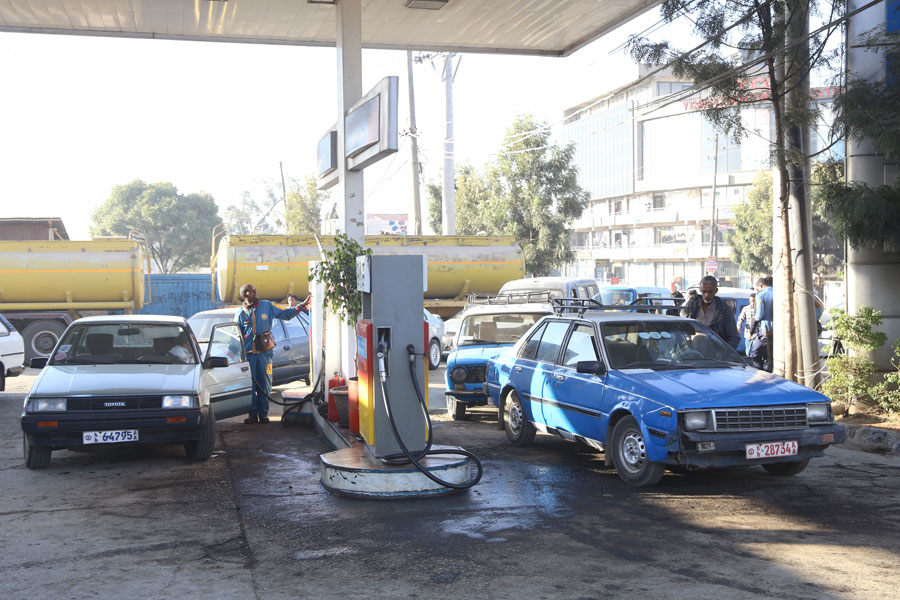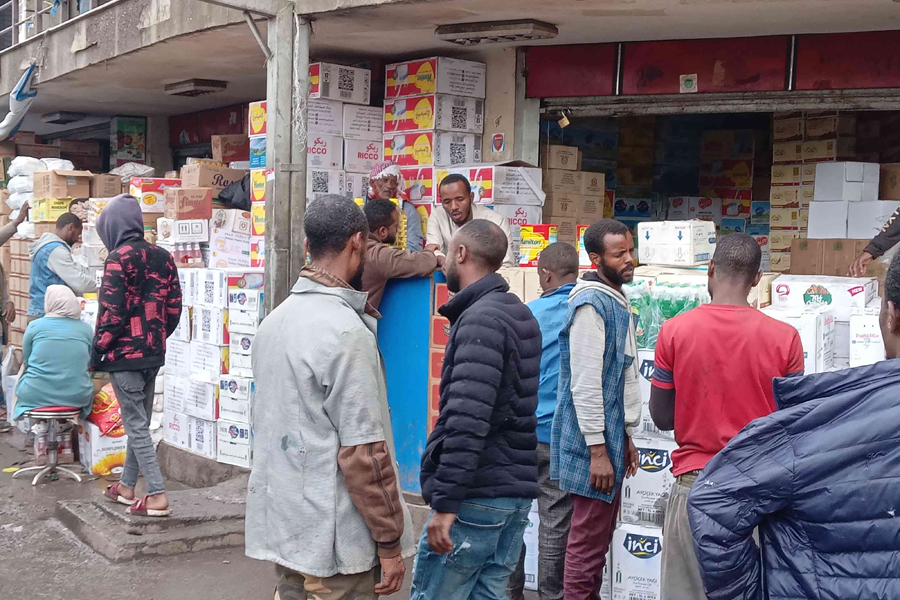
Fortune News | Jul 13,2024
Federal authorities and oil companies are at odds with each other over the cause of a diesel shortage gripping Addis Abeba for the past week. Gas stations across the city have seen long queues for hundreds of cars, as drivers are forced to wait for up to seven hours to fill their tanks.
The lines snaked so long that cars were lined up from a gas station on Tito Road (near Supermaker area in Kasanchis neighbourhood) all the way down to St. Stephen Church at Mesqel Square on Thursday. The lines jammed the roads in several places, crowding out traffic.
"After lining up for 7 hrs finally got my diesel filled up," posted @LuelyeA on Friday, June 1.
It is not a new phenomenon. Over the past half year, fuel shortages and the ensuing queues have occurred on three separate occasions – twice ahead of price adjustments and once with trucks transporting fuel from ports in Djibouti having issues with federal transport authorities. The supply and pricing of petroleum products have long been a recurring nightmare for drivers and authorities.
The industry battles with the continued depreciation of the Birr. No less daunting is the foreign currency crunch, the ever-increasing demand that comes with the population growth and growing economic activities, contraband trade to neighbouring countries, and alleged hoarding. At the onset of the most recent shortage, officials at the Petroleum & Energy Authority established a task force. They fielded its members across the country tracking the whereabouts of fuel trucks.
"Two hundred trucks with fuel were hidden in the premises of schools and factories,” said Bekelech Kuma, communications director.
The Authority was rechristened following the restructuring of federal agencies last October. It is under the purview of the Ministry of Trade & Regional Integration (MoTRI). It ordered the 37 oil companies last week to report on the status of the trucks operating under them. Only nine complied, disclosed Bekelech.
She warns that truck owners that do not deliver their cargo by the coming week will face serious measures.
“We'll seize the trucks,” she told Fortune.
Officials claim the top five oil companies, which control over 80pc of the market share, are the major source of the problem.
Incorporated in 2004 with an initial capital of 100 million Br, National Oil Company (NOC) is the top dog in the industry with a 33.7pc market share. Libya Oil Ethiopia Ltd follows with 18.5pc, followed by TotalEnergies Ethiopia, Yetebaberut Beherawi Petroleum (YBP), and TAF Oil Plc. Nonetheless, the managers of the oil companies say they have complied with the Authority's orders.
“We've reported on the status of the trucks operating under us,” said Aschalew Workeye, logistics manager of TAF Oil.
TAF Oil Plc joined the market in 2011 and operates over 100 pumping stations. The Manager claims the shortages were caused by difficult weather conditions in Djibouti, where strong winds and heavy dust delayed the loading process.
“There was a long queue because of this," he told Fortune.
Lemessa Tufa, director of distribution at the Authority, admits there are logistical challenges in Djibouti but maintains the problems have not deterred trucks from transporting the daily fuel quota.
Oil companies buy fuel from the state-owned Ethiopian Petroleum Supply Enterprise (EPSE), the sole importer of petroleum products, after shipments reach Djibouti. They are responsible for distribution to over 1,300 gas stations across the country. The Enterprise supplies an average of 2.9 million litres of benzene and nine million litres of diesel daily.
Aschalew argues the situation in Djibouti is evidenced by the GPS devices installed on the trucks.
“The system signals when trucks are not moving for more than four hours,” he told Fortune.
While oil companies and officials lock horns over the root of the problem, vehicle owners have been left out in the cold. At the end of last week, Yosuf Adane, owner of an old, worn-out pickup truck, found himself stuck in the streets of the Bulgaria area in a futile attempt to fill his tank at a station operated by TotalEnergies Ethiopia.
Although he waited half a day, Yosuf was forced to return home with an empty tank. The station had run out of fuel. To his relief, he fared better at his second attempt the following day.
Yosuf is one of many whose daily lives have been inconvenienced by the shortages in diesel fuel supply last week.
Efrem Tesfaye owns the station and a fleet of fuel trucks. He says supply disruptions have been recurring over the past weeks. Under better circumstances, his station sells up to 1.5 million litres of fuel a month.
The queues at the station had not grown shorter by the end of the week, the reasons why remains elusive to the authorities and the rest.
PUBLISHED ON
Jul 02,2022 [ VOL
23 , NO
1157]

Fortune News | Jul 13,2024

Fortune News | Jun 24,2023

Agenda | Jan 19,2019

Fortune News | Aug 04,2024

Fortune News | May 21,2022

Dec 22 , 2024 . By TIZITA SHEWAFERAW
Charged with transforming colossal state-owned enterprises into modern and competitiv...

Aug 18 , 2024 . By AKSAH ITALO
Although predictable Yonas Zerihun's job in the ride-hailing service is not immune to...

Jul 28 , 2024 . By TIZITA SHEWAFERAW
Unhabitual, perhaps too many, Samuel Gebreyohannes, 38, used to occasionally enjoy a couple of beers at breakfast. However, he recently swit...

Jul 13 , 2024 . By AKSAH ITALO
Investors who rely on tractors, trucks, and field vehicles for commuting, transporting commodities, and f...

Jun 28 , 2025
Meseret Damtie, the assertive auditor general, has never been shy about naming names...

Jun 21 , 2025
A well-worn adage says, “Budget is not destiny, but it is direction.” Examining t...

Jun 14 , 2025
Yet again, the Horn of Africa is bracing for trouble. A region already frayed by wars...

Jun 7 , 2025
Few promises shine brighter in Addis Abeba than the pledge of a roof for every family...